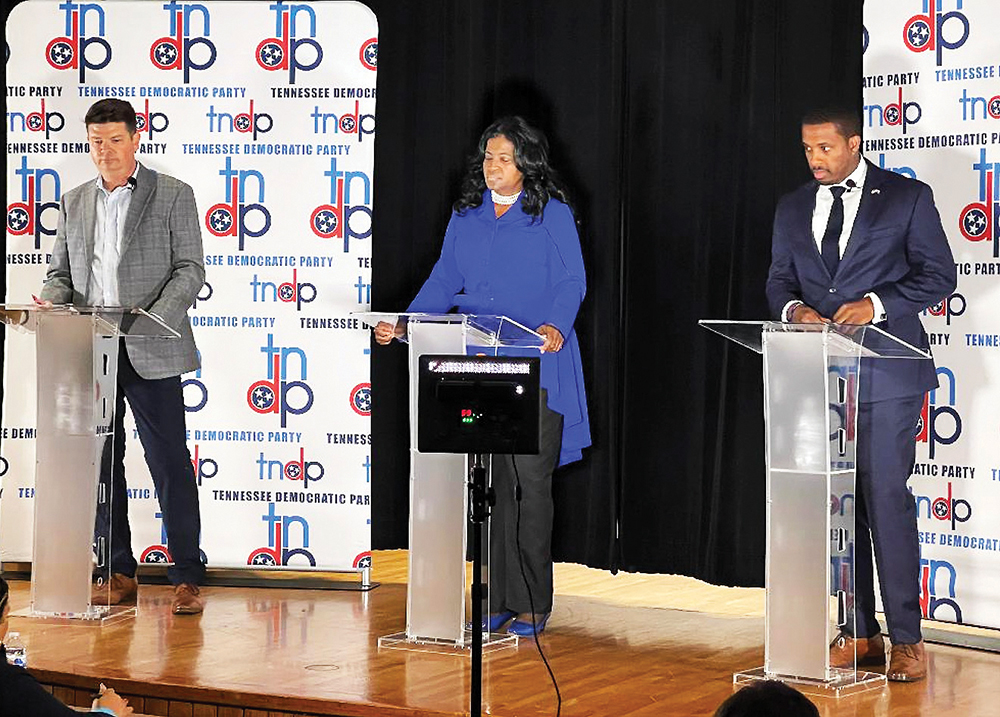We’re all entitled to a brain freeze once in a while. Who among us has not suffered one in an embarrassing public moment? But Carnita Atwater, a Memphian and a declared candidate for governor of Tennessee, went for gold with one on the night of Tuesday, July 12th.
The first comment Atwater made from the stage of the Little Theater in the Alma C. Hanson Student Center at LeMoyne-Owen College was in response to a lead-off question that moderator Jasmine Boyd addressed to all three candidates for the Democratic nomination — the others being Nashville physician Jason Martin and Memphis Councilman JB Smiley.
Atwater, an activist for the New Chicago neighborhood and a former nurse, would say the following:
“Thank you for that question. As the next incoming governor, I will have a plan that affords all Tennesseeans to have a seat at the table of prosperity. I will go and do questionnaires across the 95 counties to identify and assess the needs of each county. Most counties are different. Most counties have different needs. So I want to dictate to the community. I want to meet their needs. So that’s why I’ll do a questionnaire, do the accessibility, and then draw up my plan.”
Quote unquote.
Martin was next, delivering a well-considered statement stressing, among other things, the need to shore up public education, vo-tech and otherwise; to renew the matter, so far rejected by the Republican legislative supermajority, of accepting federal funds for Medicaid expansion; and to bring broadband to all corners of the state.
In his turn, Smiley — who is equal parts demonstrative and reserved and who would consistently feature some aspect of himself to answer to all questions — noted that he lived only three blocks away from the site of the forum in an underserved community and made a pitch for instituting a living wage and for workforce development programs because “the jobs are coming, the global city is here.”
At this point, Atwater had a question of her own, addressing it to Boyd: “I want to make sure I understand the rules. Do we have 90 seconds to respond? Because I noticed that others are getting one minute and 30 seconds. So I want to make sure we follow the rules.”
Very politely and without missing a beat, Boyd explained: “Yes, ma’am, one minute and 30 seconds is the equivalent of 90 seconds.”
And the forum went on from there, Atwater’s first questionnaire having gotten an answer of sorts. (More on the forum and the Democratic gubernatorial primary will be featured online at memphisflyer.com.)
• In addition to the state, federal, county, and judicial races covered in the July 14th issue of the Flyer (in this space and in that week’s cover story), several other races on the August 4th ballot, listed below, deserve attention. Only contested races are included for the categories indicated. Incumbent’s names are italicized.
Memphis Term Limits Referendum — One of the most widely anticipated measures on the August 4th ballot is a referendum for Memphis voters that would alter the current limit of two terms for mayor and City Council members, extending that limit to three terms. Interest in the referendum has been enhanced by a declaration from current Mayor Jim Strickland that he would seek a third term in 2023 if it should pass.
City of Memphis Special Election — Municipal Court Judge, Division 1: Kenya Hooks, Carolyn S. Watkins.
Shelby County School Board races — District 1: Chris Caldwell, Michelle McKissack, Rachael Goodwin Spriggs; District 6: Charles Everett, Timothy Green Jr., Kenny Lee, David Page, Tiffani Perry, Keith Williams; District 9: Joyce Dorse-Coleman, Rebecca Jane Edwards.
Arlington Municipal Election — Alderman, Position 4: Oscar L. Brooks, Jordan D. Hinders; Alderman, Position 5: Harry McKee, Steven Smith. School Board, Position 3: Jonathan Dunn, Hugh Lamar; School Board, Position 5: Dale A. Viox, Cathy Wilson.

 JB
JB